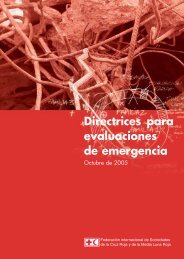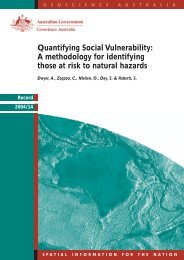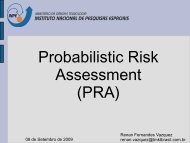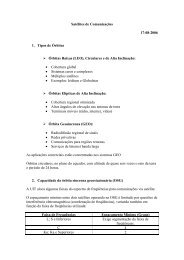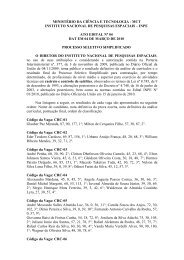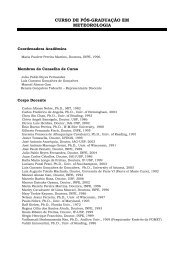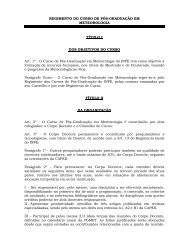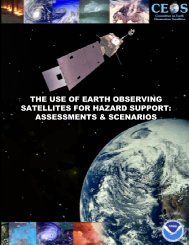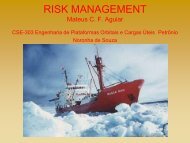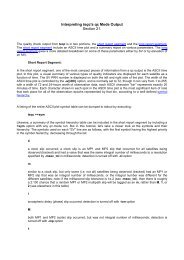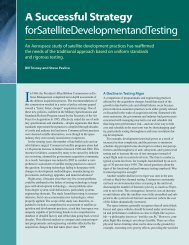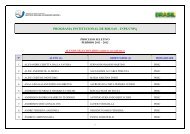Living with Risk. A global review of disaster reduction initiatives
Living with Risk. A global review of disaster reduction initiatives
Living with Risk. A global review of disaster reduction initiatives
Create successful ePaper yourself
Turn your PDF publications into a flip-book with our unique Google optimized e-Paper software.
5<br />
<strong>Living</strong> <strong>with</strong> <strong>Risk</strong>: A <strong>global</strong> <strong>review</strong> <strong>of</strong> <strong>disaster</strong> <strong>reduction</strong> <strong>initiatives</strong><br />
270<br />
A number <strong>of</strong> activities focused on communitybased<br />
flood mitigation and management are ongoing<br />
or have been completed in the Mekong Basin.<br />
New projects will capitalize on these <strong>initiatives</strong>,<br />
thereby strengthening networks, building mutual<br />
trust and developing pr<strong>of</strong>essional practice and<br />
expertise.<br />
Similar approaches have been developed elsewhere.<br />
The European Union’s OSIRIS project and<br />
Information Society Technologies Programme assessed<br />
the potential added value <strong>of</strong> so-called “new information<br />
and communication technologies” for<br />
flood-related warning and information management.<br />
The project also studied conditions for<br />
effective operation <strong>of</strong> such tools, as well as social<br />
ownership. In 2000-2001 the European Centre on<br />
<strong>Risk</strong> Prevention (CEPR), Niort, France, organized<br />
community-based workshops. A two-phased<br />
study was carried out to understand differences in<br />
risk perceptions and information demands<br />
amongst stakeholders, and to survey the social relevance<br />
and efficiency <strong>of</strong> existing or planned flood<br />
warning systems. In Hungary and Mozambique,<br />
the United Nations Educational, Scientific and<br />
Cultural Organization (UNESCO) carried out a<br />
study on flood-related information management<br />
systems and public participation at communitylevel<br />
in flood mitigation and control.<br />
These examples confirm that early warning strategies<br />
should not be separated from broader development<br />
planning and poverty <strong>reduction</strong> goals.<br />
Practical and tangible objectives or immediate<br />
incentives are likely to trigger communities’ commitment<br />
to user-based processes. Respectful<br />
understanding <strong>of</strong> existing social processes and<br />
capitalizing upon them are keys to successful<br />
schemes for public participation.<br />
Support at the international<br />
and regional levels<br />
The third requisite for the emergence, maintenance<br />
and improvement <strong>of</strong> effective early warning<br />
systems is the support provided by international<br />
and regional institutions and networks. The following<br />
principles provide a basis to guide the collaboration<br />
and coordination efforts required at<br />
the international and regional levels.<br />
First <strong>of</strong> all, international and regional support<br />
provides incentives and motivation to strengthen<br />
and improve early warning capabilities, while at<br />
the same time ensuring coordination <strong>of</strong> activities<br />
and facilitating the exchange <strong>of</strong> knowledge.<br />
There are many benefits to be found in the<br />
three-tiered support structure in which international/<strong>global</strong><br />
efforts are mobilized to<br />
strengthen and build capacity at the regional<br />
level, which level does the same at the national<br />
level.<br />
As seen in the examples given in this chapter,<br />
regional processes provide a framework for<br />
action at the national level; regional institutions<br />
provide advice and motivation to national institutions;<br />
these assist in fund-raising and are key<br />
interlocutors for governmental authorities<br />
thanks to their appreciation <strong>of</strong> national circumstances;<br />
finally, they assist countries to play<br />
their part in international activities.<br />
International cooperation provides essential<br />
financial and support in kind to build national<br />
early warning capacities. Major networking<br />
<strong>initiatives</strong> that facilitate exchange <strong>of</strong> information<br />
and experience and linkage <strong>with</strong> international<br />
agendas are launched through international<br />
cooperative arrangements for the benefit<br />
<strong>of</strong> national institutions. Specific activities such<br />
as the development <strong>of</strong> uniform standards and<br />
concepts can only take place internationally<br />
<strong>with</strong> the cooperation <strong>of</strong> as many United<br />
Nations Member States as possible.<br />
Recent activities undertaken at the international<br />
level include the Expert Meeting on Early<br />
Warning and Sustainable Development held in<br />
March 2002, under the auspices <strong>of</strong> the German<br />
Committee for Disaster Reduction (DKKV),<br />
<strong>with</strong>in the framework <strong>of</strong> ISDR. The purpose <strong>of</strong><br />
the meeting was to translate what is needed<br />
from the ongoing early warning process into<br />
concrete recommendations for action. The<br />
rationale <strong>of</strong> the initiative was to define modalities<br />
to implement the action plans and strategies<br />
resulting from the work carried out during the<br />
past decade and to take the opportunity <strong>of</strong> the<br />
upcoming WSSD to increase the visibility <strong>of</strong><br />
the early warning process. Outputs <strong>of</strong> the meeting<br />
are intended to serve the WSSD preparatory<br />
process and beyond.<br />
The meeting was instrumental in reiterating<br />
the contribution <strong>of</strong> early warning systems to<br />
the process <strong>of</strong> achieving sustainable development.<br />
Building on the elements <strong>of</strong> early warning<br />
and <strong>disaster</strong> <strong>reduction</strong> negotiated in the



